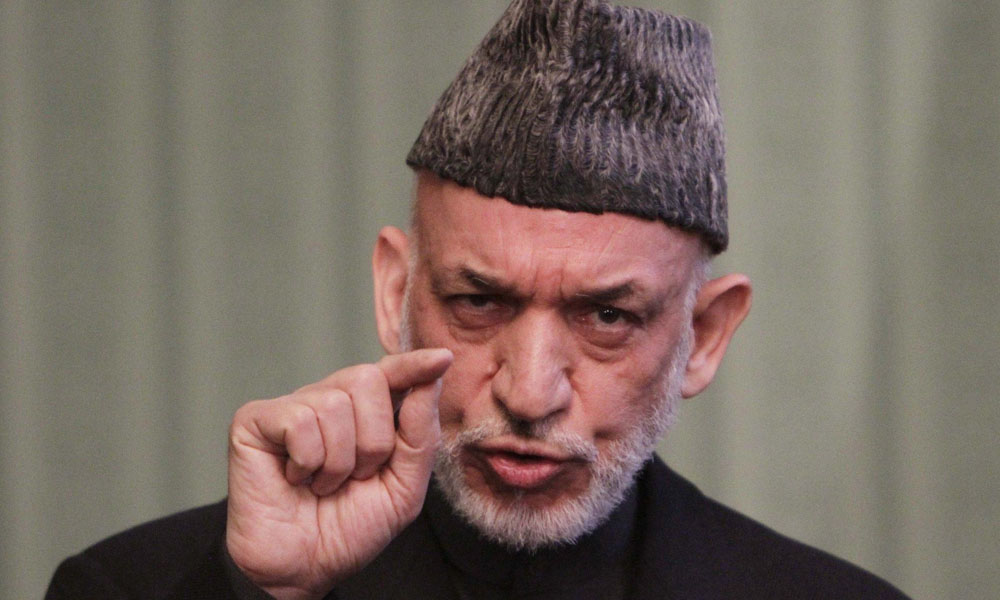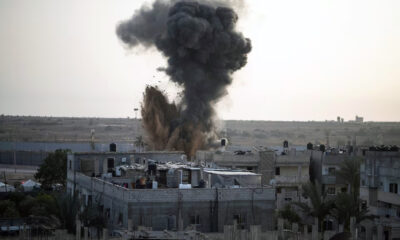Latest News
Karzai says Pakistan must not interfere in Afghanistan’s affairs

Former Afghanistan President Hamid Karzai said the current Islamic Emirate of Afghanistan’s (IEA) government in needs internal legitimacy in order for it to gain international recognition and that Pakistan should not interfere in Afghanistan’s affairs.
In an interview with VOA, Karzai said that internal legitimacy could only be achieved through the expression of the will of the Afghan people, either in the form of elections or holding the Loya Jirga, a traditional grand council.
He said that Afghanistan is at a critical juncture in its history and Afghans have a responsibility to “unite” and create a government premised on “the expression of the will of the Afghan people.”
“Legitimacy within our own country for this government (IEA) or for any other government is the foundation of recognition by countries and the international community,” Karzai said.
Pakistani leaders, including Prime Minister Imran Khan and Foreign Minister Shah Mahmood Quresh, have advocated for the IEA and have urged the international community to work with the new government in Kabul.
“If we neglect Afghanistan right now, there’s a huge humanitarian crisis looming ahead, and this will have serious repercussions not just for the neighbors of Afghanistan, but it will have repercussions everywhere,” Imran Khan told the U.N. General Assembly in September.
“We must strengthen this current government, stabilize it, for the sake of the people of Afghanistan. What have the Taliban (IEA) promised? They will respect human rights, they will have an inclusive government, they will not allow this soil to be used by terrorists,” Khan added.
Karzai told VOA that Pakistan is not the representative of the Afghan people.
“My message to Pakistan, our brotherly country, is that they should not try to represent Afghanistan. On the contrary, the country should try to establish a civil relationship with our country,” he said.
“We have deep people-to-people relations with Pakistan. … Our hope from Pakistan is that the country should not try to maintain its relations with us through interference, the encouragement of extremism and terrorism or by force, but rather establish relations with Afghanistan through civil principles and principles of international relations, and we will happily maintain that relationship with them,” he added.
Karzai also voiced concerns about the Islamic State (Daesh) terror group’s uptick in violence in Afghanistan and deemed it a threat to both Afghanistan and the region.
The militant group’s local branch, known as the Islamic State Khorasan, has claimed responsibility for several vicious attacks in recent weeks in Kabul, Kunduz and Kandahar provinces, where more than 100 civilians have been killed and many others wounded.
“As proven by the unfortunate bomb blasts — rather, suicide attacks in the mosque in Kabul two weeks ago, then in Kunduz last week, and then in Kandahar yesterday (October 15) — this has proven that Daesh is a threat to Afghanistan and to the life and livelihood of the Afghan people,” Karzai said.
Karzai showed optimism that the region will support Afghanistan in its fight against Daesh because it could pose a threat to their security. In addition, he said he hopes that regional powers would seek common ground in Afghanistan,.
He said it is Afghanistan’s responsibility to work with other countries in the region in a way that results in peace and stability.
Latest News
Afghanistan’s problems caused more damage to Pakistan than 3 wars with India: Durrani

Islamabad’s special envoy for Afghanistan Asif Durrani said on Wednesday that Pakistan has suffered more due to Afghanistan’s internal situation than Pakistan has suffered in three wars with India in terms of blood spilt and finances drained.
Durrani said at a one-day International Conference titled “Pakistan in the Emerging Geopolitical Landscape”, which was organized by the Institute of Strategic Studies Islamabad (ISSI) and the German Friedrich Ebert Stiftung (FES), that over 80,000 Pakistanis died in the two decades of the War on Terror and that his country was still counting its dead and injured.
“After the withdrawal of NATO forces, it was hoped that peace in Afghanistan would bring peace to the region. However, such expectations were short-lived,” he said.
He also stated that attacks by the Tehreek-e-Taliban Pakistan (TTP) militant group on Pakistan’s border areas increased by 65 percent, while suicide attacks increased by 500 percent.
“The TTP’s enhanced attacks on Pakistan while using Afghan soil have been a serious concern for Pakistan. Another worrying aspect is the participation of Afghan nationals in these attacks,” he said.
Durrani also said Pakistan had suffered geopolitically since the Soviet Union invaded the neighboring country.
“The post-9/11 world order has negatively impacted Pakistan. Apart from losing 80,000 citizens’ lives, including 8,000 law enforcement agency personnel, the country’s economic opportunity cost is estimated at $150 billion,” Durrani said.
Talking about the future outlook for Pakistan in the regional context, Durrani said that while “our eastern neighbor is likely to continue with its anti-Pakistan pursuits, the western border poses an avoidable irritant in the short to medium term.”
However, he said Pakistan can overcome its difficulties with Afghanistan, including the TTP challenge.
Latest News
Afghanistan now a ‘nexus for diplomatic endeavors’, says IEA

In the wake of dozens of meetings between high-ranking Islamic Emirate officials and visiting officials from foreign countries, and other diplomatic advances, the IEA said on Thursday that in the current geopolitical landscape, Kabul now “serves as a nexus for diplomatic endeavors and political deliberations pertaining to global affairs”.
In a series of posts on X, the IEA’s spokesman Zabihullah Mujahid said diplomatic missions and political delegations from various nations, including Russia, Malaysia, Kazakhstan, Turkmenistan, the European Union, and others, “are evident in the capital, highlighting its strategic importance in fostering Islamic cooperation”.
He said: “Recently, the honorable Minister of Transport of the Islamic Emirate, Mr. Hamidullah Akhundzada, led a significant delegation to Termez, Uzbekistan, for essential discussions aimed at enhancing bilateral relations.
“These discussions encompass a wide range of topics, from trade facilitation to security assurances, indicating a focused effort by the Islamic Emirate to strengthen and broaden its international engagements, thereby ensuring sustained development and stability.
“These initiatives, characterized by diligence and effectiveness, underscore Afghanistan’s enduring commitment to diplomatic engagement and its pivotal role in regional and global affairs,” he said.
Mujahid added that these initiatives “also emphasize the vital connection between diplomatic efforts and economic prosperity, promising favorable outcomes for Afghanistan’s socio-economic landscape.”
He pointed out that despite ongoing challenges, Afghanistan “remains steadfast in its pursuit of prosperity and resilience, defying pessimistic projections and charting a course towards political and economic renewal.”
He said: “Continued efforts are essential to fostering inclusive growth and impactful initiatives, thus advancing Afghanistan’s journey towards sustainable development and increased influence on the global stage.”
Latest News
Mullah Baradar discusses creation of railway with Kazakh deputy PM

Mullah Abdul Ghani Baradar, deputy prime minister for economic affairs has met with Erik Zhumangarin, the Deputy Prime Minister of Kazakhstan, and discussed the establishment of a railway network from Kazakhstan to Pakistan through Turkmenistan and Afghanistan, the deputy PM’s office said in a statement.
During the meeting, Baradar emphasized the need to sign agreements to solve the banking problems of traders from both countries, the creation of Afghan-Kazakh joint companies, and the facilitation of visas for Afghan traders.
According to the statement, the Deputy Prime Minister of Kazakhstan said that the Kazakh government intends to establish a joint chamber of industry and commerce and a joint trade and labor group between the two countries, and is ready to cooperate with Afghanistan in the sectors of e-governance, industry, higher education, education, health, and banking.
-

 Sport5 days ago
Sport5 days agoAfghanistan Champions League kicks off with grand opening ceremony
-

 Latest News4 days ago
Latest News4 days agoPakistan’s frontiers minister stresses ‘dignified’ return of Afghan refugees
-

 Regional3 days ago
Regional3 days agoIranian president lands in Pakistan for three-day visit to mend ties
-

 Climate Change4 days ago
Climate Change4 days agoMassive river flooding expected in China, threatening millions
-

 Latest News4 days ago
Latest News4 days agoChinese keen to invest in Panjshir-Kabul water conduit project
-

 Latest News2 days ago
Latest News2 days agoRashid Khan named AWCC’s brand ambassador
-

 World4 days ago
World4 days agoTwo Japan navy helicopters crash, one body found, 7 missing
-

 Sport3 days ago
Sport3 days agoKolkata beat Bengaluru by one run in IPL as Kohli fumes at dismissal
























